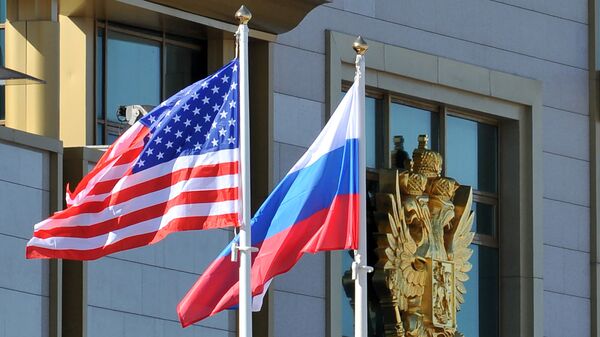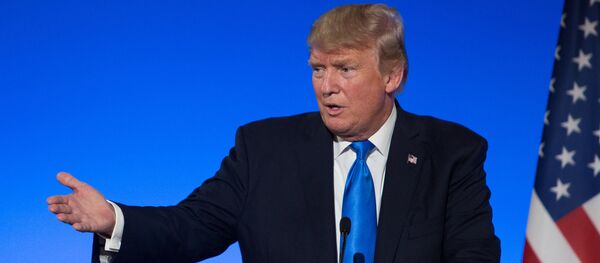Russian Prime Minister Dmitry Medvedev on Wednesday characterized the new US anti-Russian sanctions bill signed into law by President Donald Trump as a declaration of "full-fledged economic war." Medvedev also said now there was no hope for making Russia's relations with the new US administration better. Yet, Nauert contended "there is always hope for improvement."
ECONOMIC WAR ESCALATES
On Thursday, Russia's Ambassador to the United Nations Vasily Nebenzya said during a UN Security Council meeting that sanctions should not be used for economic reasons but only as a tool for resolving crises.
"These sanctions are in fact… economic warfare against Russia," author, analyst and human rights attorney Daniel Kovalik, author of "The Plot to Scapegoat Russia" told Sputnik on Thursday. "These sanctions will definitely impact joint US-Russia work on issues like Ukraine and Syria as well."
Trump destroyed his own dream of improving bilateral relations with Russia when he agreed to sign a harsh new measure boosting economic sanctions against Russia into law on Wednesday, Kovalik stated.
"Under such circumstances, Russia will have little incentive to work with the United States on Ukraine or any other matter… I think that the prospects of improving ties with Russia are quite dim now," he said.
Trump had failed to halt or even slow down the US policies he inherited that sought outright confrontation with Russia while continually increasing economic, diplomatic and military pressures on Moscow, Kovalik observed.
"The US in particular continues to go deeper and deeper down a path towards confrontation with Russia as evidenced by these sanctions, the continued eastern advance of NATO and the recent placement of Patriot missiles in the Baltics," he said.
There were already indications that the measure would backfire, provoking serious rifts between Washington and its European allies who did not want to pay the price of lost business and deteriorating relations with Russia from enforcing it, Kovalik noted.
"Judging from the EU’s reaction to the final sanctions bill, it is clear that the US did not take the EU’s concerns into account. Indeed, Germany’s Economic Minister, Brigitte Zypries, has urged the EU to fight back against these new sanctions, stating that they are against international law," he said.
The new law could also seriously derail efforts to bring peace to Ukraine a under the Minsk process after three and a half years of conflict, Kovalik remarked.
"The US for years has opposed the new Nord Stream 2 pipeline from Russia to the EU, and these sanctions are targeted at undermining that pipeline’s viability, and threaten Russia’ economic well-being," he said.
The sanctions had been pushed through on the argument that the United States needed to "punish:" Russia for interfering in the 2016 presidential election, but there was no evidence at all to justify this claim, Kovalik recollected.
"While the sanctions were passed, in large part, in response to alleged Russian meddling in the US elections, there has been little to no evidence offered of such meddling," he said.
UKRAINE’S FROZEN CONFLICT
University of Rhode Island Professor of Peace Studies Nicolai Petro told Sputnik that Trump’s decision to sign the sanctions bill into law had effectively destroyed hopes for any new era of détente such as Trump often discussed while d running for president in 2016.
Instead, the signing of the bill into law would harden the confrontation and stand-off between Washington and Moscow and ensure that no progress was made towards ending the stalemate in Ukraine, Petro noted.
"Sanctions merely perpetuate the status quo in Eastern Ukraine and Crimea," he said.
The sanctions would certainly not help the Minsk process on Ukraine but that process was already dead in the water anyway, Petro pointed out.
"Since the peace process in Ukraine is utterly stagnant, thanks to the refusal of the government in Kiev to implement the political portions of the Minsk Accords, there is nothing to hinder. Sanctions merely perpetuate the status quo in Eastern Ukraine and Crimea," he said.
"Such initiatives [as the sanctions law] reduce Russia's interest in cooperation because they highlight Trump's political impotence," he said.
European leaders and parliaments resented the high-handed attitudes of the US Congress in pushing through the new sanctions law and expected Europe to enforce them too. However, the Europeans were used to going through the motions of compliance to appease the Americans, Petro observed.
"The fact that German Foreign Minister Sigmar Gabriel, publicly criticized the sanctions… suggests both sides are dissimulating. The US pretends it takes EU concerns into account, while the EU pretends it finds US unilateralism intolerable. This charade has been going on for decades," he said.
Last week, the Russian Foreign Ministry described the new sanctions as "absolutely illegitimate" and responded with countermeasures, suspending the use of all US Embassy warehouses in Russia and cutting the size of US diplomatic staff in the country by 755 people by September 1.




